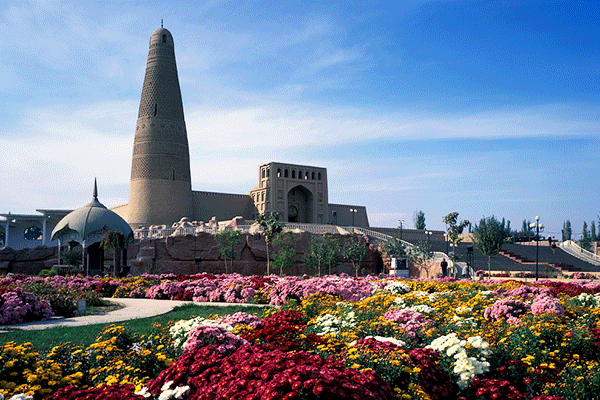Invest in Xinjiang
Overview
Located in northwestern China, the Xinjiang Uygur autonomous region is the largest in area in all the province-level administrative regions of China. It covers an area of 1.66 million square kilometers, covering one sixth of the Chinese territory.
Situated in the hinterland of Eurasian continent, Xinjiang of China borders eight countries, namely Russia, Kazakhstan, Kirghiziastan, Tajikistan, Pakistan, Mongolia, India and Afghanistan. Xinjiang served as a key hub of the renowned Silk Road in ancient China, while now it is an unavoidable part of the railway leading to the second Eurasia Continental Bridge.
Xinjiang is rich in natural resources such as rivers, minerals, forests and plants, animals and mountains. It has a total of 500 rivers in the basins of Tianshan Mountain including the Tarim River and the Ili River.
The entire region is marked by great seasonal differences in temperature and cold winters. During the summer, the Turpan Depression usually records the hottest temperatures nationwide, with air temperatures easily exceeding 40 degree C. In the far north, and at the highest mountain elevations, however, winter temperatures regularly drop to below −20 degree C.

[Photo/VCG]
Once a traditionally agricultural region, Xinjiang is abundant in minerals and oil. Under the Belt and Road Initiative, today's Xinjiang has played a major role in the nation's economic development. It is intensified with ties with inland regions as well as bordering areas to further promote the development of agriculture, industry, technology, education and health services.
In 2017, Xinjiang's GDP reached some 1.09 trillion yuan, up 7.6 percent year-on-year. Its import and export value recorded 129.84 billion yuan, up 19.9 year-on-year, with export totaling 120 billion yuan, an increase of 16.5 than the previous year and importing surpassing 19.8 billion yuan, up 45 percent year-on-year.
In terms of economic structure, the tertiary industry grew by 9.8 percent, accounting for 58.2 of its total GDP.
Pillar Industries
Relying on its geographic advantages, untouched environment, rich natural resources, spectacular landscape and cultural legacies, Xinjiang has developed a series of key industries including tourism, agriculture and high-end manufacturing.
Tourism Industry
Xinjiang recently launched a sustainable plan to boost the industrial scale and economy of its tourism industry. Last year, more than 100 million tourists from home and abroad visited Xinjiang. In the first seven months of this year, the region has received more than 78.3 million visitors, up 38.7 percent year-on-year, with tourism-related consumption reaching 121.4 billion yuan.

[Photo/VCG]
Agriculture Industry
Xinjiang is renowned for its fruits and produce, including grapes, melons, pears, and walnuts. Particularly renowned are Hami melons and Turpan raisins. The agricultural land area of the region is 63.1 million hectares, of which 6.1 million hectares is arable land.
High-end manufacturing
The high-end industries of Xinjiang have maintained rapid development pace in the first four months of this year, among which the year-on-year growth rates of high-tech manufacturing and strategic emerging industries are 48 percent and 22 percent, respectively. Many renowned enterprises, including SAIC Volkswagen, Sany Heavy Industry, Xuzhou Construction Machinery Group (XCMG), have based their operations in the region.
By 2020, the added value of manufacturing industry is expected to be doubled, accounting for more than 50 percent of the total added industrial value of the region. Xinjiang aims to build an industrial cluster of chemicals, light industry, nonferrous metal, equipment manufacturing, building materials and textiles, each exceeding 100 billion yuan.
Advantages
Serving as a vital part of the ancient Silk Road, Xinjiang has significant geographic advantages. The region is formed due to the collision of the Indian plate with the Eurasian, with diverse landforms such as basins, rivers, forests and mountains, which bring about abundant natural resources and environment. Xinjiang holds the following advantages:
First, Xijiang is a transport hub in northwest China. As a core area of the Belt and Road the Silk Road Economic Belt, Xinjiang aims to build itself a center for transport, business, logistics, cultural and technology, financial services and medical care. It plans to construct 10 import and export industrial clusters in the next few years. Meanwhile, the region will continue to play a key role in strengthening China's ties with Kazakhstan, Tadzhikistan and Mongolia.
Second, Xinjiang has adopted a two-way opening-up policy in its economic development and foreign trade. Statistics show that from 2014 to 2017, the foreign trade of Xinjiang reached $85.97 billion yuan. Under the Belt and Road Initiative, Xinjiang encourages local enterprises to go abroad by enhancing the level of branding, technologies and expanding cross-border investments.
Third, due to its unique locations and climate, Xinjiang has good natural environment and boasts rich natural resources, such as the oil and gas, glaciers, mountains, rivers and lakes.
Responsible Departments
1. Xinjiang Uygur Autonomous Region Commerce Department
Tel: 0991-2883186
Fax: 0991-2883186-700
Address: No 1292 Xinhua South Road, Urumqi
Postcode: 830049
2. Xinjiang Investment Promotion and Development Bureau
Tel:0991-4152823、4152825、4152806
3. Shihezi Economic and Technological Development Zone
With a planned area of 137 sq km, the zone has a construction area of 44.43 sq km and is the only high-tech zone that boasts the characteristics of corps in China. It is devoted to developing and industrializing cutting edge technologies and growing into an innovation-driven sci-tech city on the Silk Road Economic Belt.
E-mail: wgxjs@xdz.gov.cn
Postcode:839000